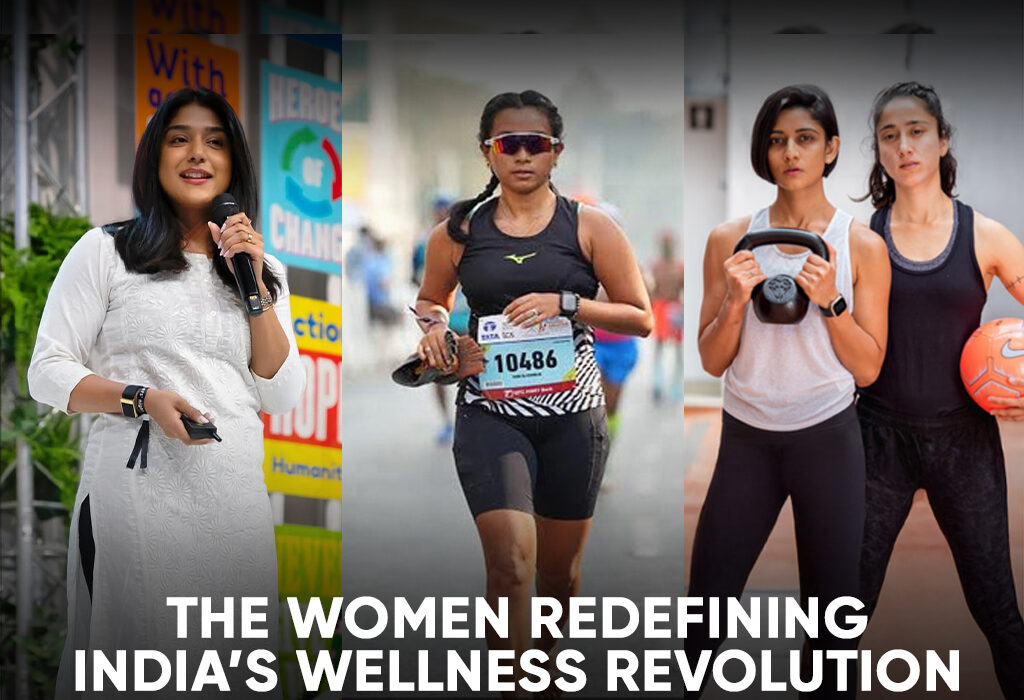For decades, India’s idea of fitness was confined to calorie counts, gym memberships, and glamorous celebrity transformations. Wellness was aspirational, but rarely accessible, a privilege, not a priority. Yet quietly, a revolution was taking shape. Across the country, women were reclaiming the meaning of health, not as a quest for perfection, but as a path to empowerment. They are founders, athletes, doctors, and healers who are transforming India’s wellness economy, turning it into one of the fastest-growing in the world.
According to a 2024 IMARC Group report, India’s health and wellness market is now valued at USD 156 billion and is expected to reach USD 257 billion by 2033, growing at an annual rate of 5.3 percent. Within this, the fitness and preventive health sectors are leading the charge, reflecting a deeper cultural shift toward self-awareness, community, and long-term well-being. This is no longer an industry driven by vanity; it’s an ecosystem powered by empathy, data, and determination.
Few embody this shift more than Priya Prakash, Founder and CEO of HealthSetGo, a preventive healthcare startup that partners with schools across 77 cities. Her vision is as pragmatic as it is transformative, to build a generation that views health not as punishment, but as empowerment. Through her programs, over 300,000 students are taught to understand their own bodies and choices, linking wellness with education in a way India has never done before. “People are finally realizing that wellness is not a luxury, it’s a lifestyle,” she says. For Priya, wellness doesn’t start in the clinic or the gym; it starts in the classroom, with conversations that teach children to value their bodies and minds equally.
This idea, that wellness is systemic, not superficial, is spreading across India’s cities, startups, and communities. One of the most powerful symbols of this change is Swetha Subbiah, the co-founder of Sisters in Sweat. What began as a small, informal football club for women in Bengaluru has evolved into one of India’s largest women-led sports and wellness collectives. Her movement focuses on participation, not performance. In a country where women are often excluded from public sports spaces, Subbiah’s initiative creates a safe, judgment-free arena where wellness and belonging coexist. “It’s not about competing,” she says. “It’s about reclaiming your body.”
While women like Priya and Swetha are bringing inclusion into preventive and community health, others are taking India’s global wellness narrative to endurance tracks and digital platforms. Ankita Konwar, born in Guwahati, Assam, is one of them, a name synonymous with resilience and reinvention. A former aviation employee who once found solace in running, she has since become a symbol of endurance fitness in India. In 2025, she made headlines as the first Assamese woman to complete the Ironman Tallinn 70.3 in Estonia, a grueling test of human stamina involving a 1.9 km swim, a 90 km bike ride, and a 21.1 km run. “What matters,” she said after the race, “is crossing the finish line as a stronger version of yourself.”
Ankita’s story is not just about athletic triumph; it’s about reclaiming agency. Through her initiative Invincible Women, she’s building an ecosystem for female runners, endurance athletes, and first-time fitness participants across India. Created as an extension of Pinkathon, India’s largest women’s running event, her movement encourages women to use public spaces confidently and safely. “Invincible Women is about growth, not competition,” she says. “When one woman crosses the finish line, a hundred others believe they can too.” Her journey, from a small town in Assam to global Ironman circuits, captures the soul of India’s new wellness identity: deeply personal, proudly local, and globally relevant.
The growth of this sector is mirrored by numbers that tell a story of transformation. Deloitte India estimates that the fitness market is worth over ₹16,200 crore (USD 1.9 billion) and will more than double by 2030, as gym memberships, boutique studios, and digital wellness platforms become mainstream. The virtual fitness segment alone, once a pandemic-born trend, has turned into a billion-dollar opportunity. Grand View Research projects that India’s online fitness market, valued at USD 350 million in 2022, will surge to nearly USD 2.9 billion by 2030. The corporate wellness industry, too, is expanding, growing from USD 639 million in 2024 to a forecasted USD 809 million by the decade’s end.
But beyond the numbers lies the human story, the women behind these businesses and movements. Entrepreneurs like Rhea Nihal Singh, co-founder of FlexNest, are merging technology and physical training to create connected fitness experiences tailored to Indian users. Nutritionist Shilpi Goel is debunking myths around diet culture through Nutrishilp, her evidence-based wellness venture that prioritizes balance over restriction. And pioneers like Vandana Luthra, founder of VLCC, continue to be remembered as architects of India’s modern wellness industry, women who paved the path for today’s inclusive, science-driven generation of wellness entrepreneurs.
The women driving this revolution face significant challenges, though. Access to funding remains limited, with wellness startups often dismissed as “lifestyle” ventures rather than scalable businesses. The surge of social media influencers and unverified fitness experts has blurred the lines between inspiration and misinformation, making credibility harder to maintain. And social conditioning continues to weigh heavily, many women still struggle with guilt for prioritizing themselves. As Dr. Nikita Mittal, founder of Danzofit, observes, “There’s this idea that taking care of yourself is selfish. But how can you pour from an empty cup?”
Yet, it is precisely these challenges that fuel innovation. Women-led ventures are pioneering hybrid models that blend online accessibility with offline community, making fitness more inclusive than ever. The rise of femtech, focusing on menstrual health, hormonal balance, fertility, and menopause, is adding new depth to India’s wellness map. In parallel, mental health, mindfulness, and holistic healing are finding equal footing with physical fitness, reflecting a maturing understanding of wellness as an integrated experience.
According to Expert Market Research, India’s wellness tourism industry, spanning yoga retreats, Ayurvedic centers, and holistic resorts, is currently valued at USD 21.2 billion and is projected to nearly double by 2034. This indicates that India’s global identity as a destination for spiritual and physical healing remains not just relevant, but resurgent. What’s changing is who’s leading it. For the first time, women are at the helm, not just as practitioners, but as visionaries, strategists, and CEOs.
In this landscape, the women shaping India’s wellness revolution are not selling workouts or diets. They’re offering philosophies, ways of living that combine purpose with patience, movement with mindfulness, and ambition with compassion. They’re dismantling old hierarchies and replacing them with empathy-led leadership. And in doing so, they’re teaching the world something profound: that true strength doesn’t come from perfection; it comes from presence.
As India’s wellness economy races toward the quarter-trillion mark, its most powerful driving force isn’t money, it’s meaning. From classrooms to corporate boardrooms, from the streets of Bengaluru to the Ironman tracks of Estonia, women like Priya Prakash and Ankita Konwar are proving that wellness is not a destination but a direction, a lifelong dialogue between the body, the mind, and the will to rise.
In a nation once obsessed with transformation photos, these women are rewriting the story. They remind us that the greatest transformation is not in how we look, but in how we live.






